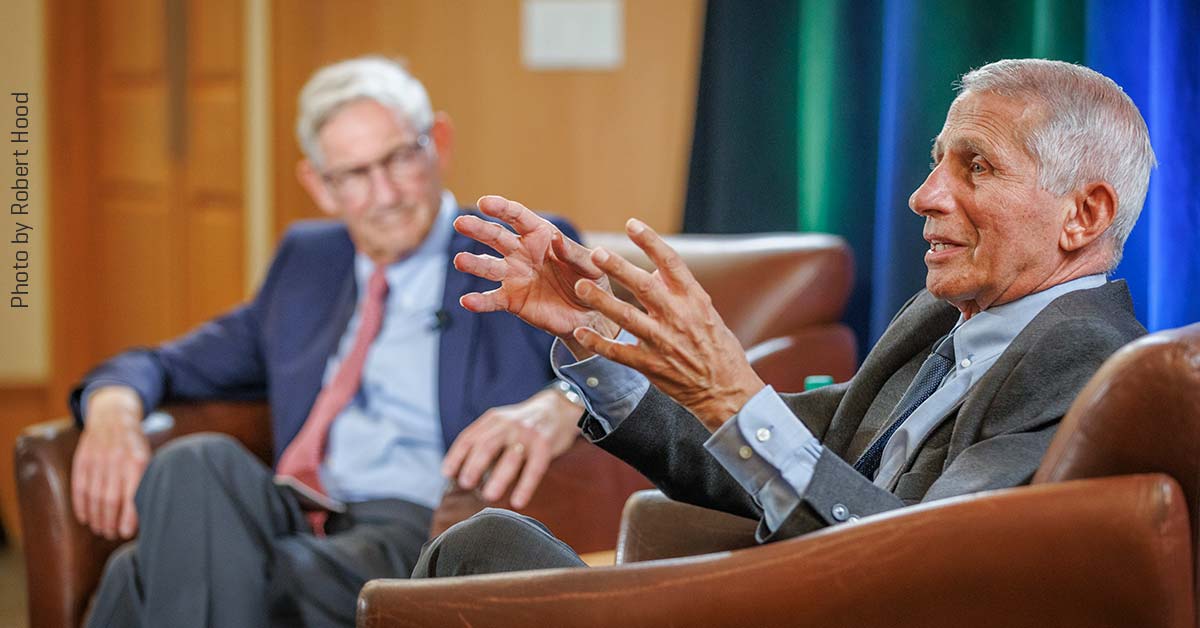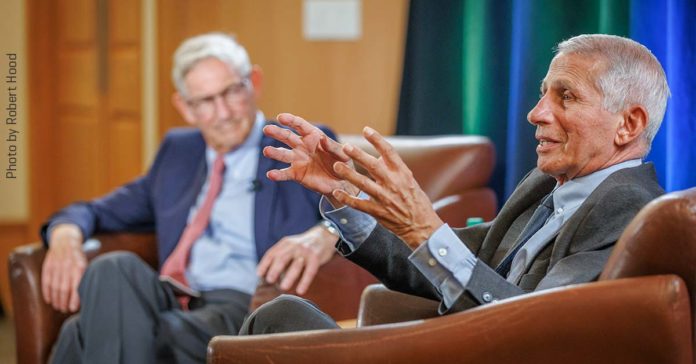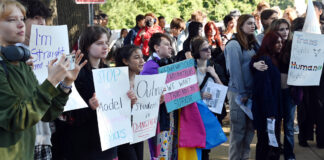
Fauci explained how over the years, he worked to shift money within NIAID to cover AIDS research. When he needed to build a clinical trials network to test the new drugs that eventually were to turn HIV/AIDS from a death sentence to a manageable disease, he turned to Corey, who was experienced in the design of antiviral clinical trials dating back to his work on the development of the first antiviral drug for herpes, acyclovir.
In the decade after the development of effective HIV/AIDS drugs, Fauci’s attention turned to addressing the unmet need for such medications in Africa and in developing countries where case numbers were dwarfing anything that had been seen in the U.S.
Fauci recounted how President George W. Bush put him in charge of designing a program called PEPFAR — the President’s Emergency Plan for AIDS Relief — that since its launch in 2003 has invested more than $100 billion in bringing low-cost drugs to developing countries and saved an estimated 21 million lives.
Fauci told Corey that he had originally hoped to persuade President Bush to support a $500 million program to reduce the transmission of HIV from mother to child, but Bush told him, “This is not enough, go back and give me something that’s totally transforming.”
“I told him, ‘Mr. President, this could cost billions and billions of dollars.’ And he told me, ‘Let me worry about the money,’” Fauci said.
Bush inserted, without telling the press or Congress, a line into his 2003 State of the Union address calling for a five-year, $15 billion commitment, and the rest is history.
“I say this with all sincerity,” Fauci said. “The credit all goes to George W. Bush. It would not have happened if he didn’t say he was totally committed to doing it. This is a side of him that most people don’t appreciate.”
Corey summed up the effort: “I think it has saved more lives than any other program in the history of mankind.”
A focus on developing an HIV/AIDS vaccine
Even before PEPFAR was developed and launched, Fauci’s relationship with Corey deepened with the establishment of the HIV Vaccine Trials Network, or HVTN, the largest publicly funded international collaboration focused on evaluating HIV/AIDS vaccines. Based at Fred Hutch, it has carried out dozens of clinical trials, large and small, on potential vaccines and components for two decades.
Although an effective vaccine remains elusive, the program continues to refine the science behind the immune response to HIV and the design of vaccine strategies that can elicit broadly neutralizing antibodies of the sort researchers believe will ultimately be able to prevent HIV infections.
HVTN established not only an international network of clinical vaccine trial sites, but a model of community involvement in the design of such trials as well. When it became apparent within months of the emergence of SARS-CoV-2 that a vaccine was both essential and possible, Fauci worked with Corey and others, with the HVTN model in mind, to develop a framework for conducting massive clinical trials.
The effort made possible — within the Trump administration’s Operation Warp Speed — the clinical trials that brought effective vaccinations against COVID-19 by the end of 2020.
While that success has been gratifying, Fauci still expresses bafflement at the hesitancy of many Americans to avail themselves of vaccination against SARS-CoV-2.
“When you have a disease that has killed one million Americans,” Fauci said to Corey, “and you have hesitancy to use a lifesaving intervention — which is a vaccine and a booster — it seems like, ‘What world are we living in?’ … It’s almost inexplicable.”
Fauci predicted that new booster shots would be available from Pfizer by the middle of September, with a similar booster from Moderna by late September or early October. Yet he is alarmed that vaccination rates are lagging, while the virus continues to change.
Fauci was blunt that misinformation is eroding trust in scientists and the work they do.
“Some people don’t want to get vaccinated because they don’t have enough information about it, and it’s not that they are inherently anti-vax. For others it’s because so much misinformation is thrown at them, and they don’t have good, trusted messengers to give them the right information. And then there are others that are just hard core, and there is nothing you’re going to change their minds,” he said.
Fauci said that he has had opportunities to deliver commencement addresses earlier this summer, and the core message he wanted to give young people is “Don’t accept the normalization of untruths.”
“There’s so much preposterous lying going on,” he said, “… and when people who have a lot of other things going on in their lives they have to worry about, they kind of start accepting it, and all of sudden lying becomes normal… Don’t accept as normal flagrant distortions of truth and reality, because once you do that, nothing counts.”








